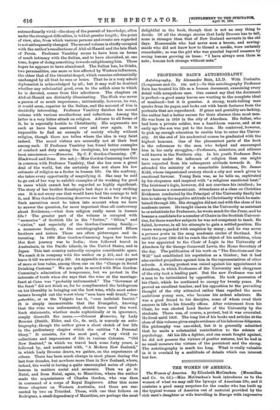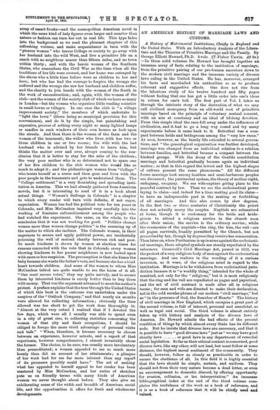The Women of America. By Elizabeth McCracken. (Macmillan and Co.
6s. 6d.)—Miss McCracken's book introduces us to the women of what we may call the byways of American life, and it contains a good many surprises for the reader who has built up the typical woman of America out of material provided by the rich man's daughter or wife travelling in Europe with impressive
nature or fashion can turn her out in real life. This type fades into the background as we read the pleasant chapters of this refreshing volume, and make acquaintance in turn with the "pioneer woman" who leaves College or society to go away with her husband into the wild West, and live a primitive life on a ranch with no neighbour nearer than fifteen miles, and no town within thirty ; and with the heroic woman of the Southern States, who remembers the Civil War as the time when all the traditions of her life were overset, and her home was outraged by the slaves who a little time before were as children to her and hers; but who has had the courage to forgive the wrongs she suffered and the wrongs she saw her husband and children suffer, and the charity to join hands with the woman of the North in the work of reconstruction ; and, again, with the woman of the club—not the woman of the society club of which we have so many in London—but the woman who organises little reading societies in small towns or villages. In one ease the club is "a village improvement society," the members of which undertake to "light the town" (there being no municipal provision for this convenience), and do it by the simple, but painstaking and expensive, process of setting every night so many lighted lamps or candles in such windows of their own houses as look upon the streets. And then there is the woman of the farm and the woman of the tenement; the widow who lives .with her two or three children in one or two rooms ; the wife with the bad husband who is advised by her friends to leave him, but thinks the matter over and over, always coming to the con- clusion that it is better to stay for the sake of the children ; the very poor mother who is so determined not to spare one of her five children to the rich woman who would like so much to adopt it ; and the philanthropic woman from "College" who trains herself as a nurse and then goes and lives with the poor people in the tenements and gets to understand them. The "College settlement" is a very flourishing and spreading insti- tution in America. This we had already gathered from American novels, but it is interesting to read of it in a book about actual things. "Woman's Suffrage in Colorado" is a chapter to which every reader will turn with definite, if not eager, expectation. Woman has had the political vote for ten years in Colorado, and Miss McCracken inquired very carefully into the working of feminine enfranchisement among the people who had watched the experiment. She came, on the whole, to the conclusion that it was not working for good. "Politics change women more than women change politics" is the summing up of the matter to which she inclines. The Colorado women, in their eagerness to secure and apply political power, are incidentally poisoning the well of mutual charity between rich and poor. So much kindness is shown by women at election times for reasons connected with the vote that in Colorado every woman showing kindness to her poorer neighbours is now looked upon with more or less suspicion. The presumption is that she kisses the baby because she wants the father's vote, not because she has a kind heart towards children. And some of the women to whom Miss McCracken talked are quite unable to see the harm of it all. "One must secure votes," they say quite naively, and to secure them by interested kindness is surely better than to buy them with money. That was the argument advanced to meet the author's pretest. A preface explains that the tour through the United States of which this book is the outcome was undertaken under the auspices of the "Outlook Company," and that nearly six months were allowed for collecting information ; obviously the time allowed was too short to get the work done thoroughly in. "Almost at the very outset I realised that if I devoted the few days, which were all I usually was able to spend even in a city of great size, to collecting statistics concerning the women of that city and their occupations, I should be obliged to forego the more vivid advantage of personal visits and talk." "When, therefore, it became necessary to choose between an experience, however minute, and a report of that experience, however comprehensive, I almost invariably chose the former. The choice, to be sure, was usually more involuntary. than premeditated; a woman appealed to me so much more keenly than did an account of her attainments ; a glimpse of her work had for me far more interest than any report of its processes possibly could have." The art of making what has appealed to herself appeal to her reader has been mastered by Miss McCracken, and her series of sketches puts us on friendly terms with many kinds of American women we never thought about before. They also give an exhilarating sense of the width and breadth of American social life, and the opportunities it offers for fresh and wholesome developments.



















































 Previous page
Previous page